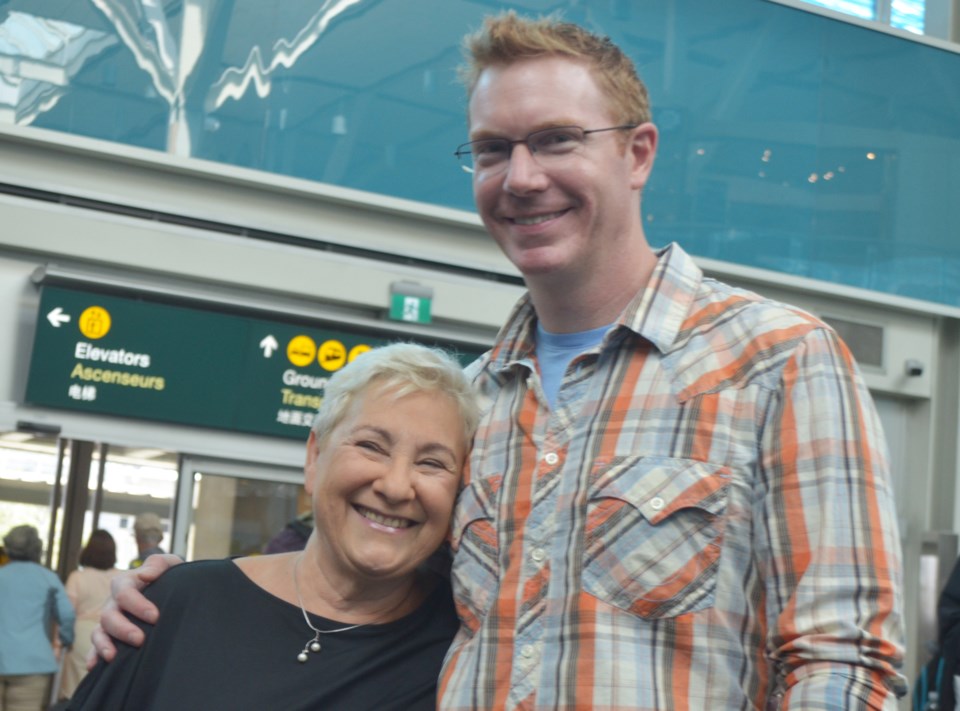Twelve years ago, SFU lecturer Luba Banuke was given five years to live by her doctors.
On Aug. 10, she’ll celebrate a decade since her life-saving transplant with a donor.
A lecturer at Simon Fraser University, Banuke was planning a trip to Europe with friends in September 2007 when she started feeling sharp pains in her ribcage.
After being prompted by her daughter to go see a doctor, Banuke received the news no one wants to hear: terminal cancer.
Banuke was diagnosed with T-cell lymphoma, a rare type of cancer affecting the cells that defend the body from germs.
She was diagnosed at stage IV, an indication that the cancer had already spread. Doctors gave her a maximum of five years to live.
Survival rates for women with T-cell lymphoma are only 20 per cent; for men it’s even lower at 10 per cent. She felt more ill by the day and her organs started to become enlarged and push against each other.
“It was bad news after bad news after bad news,” she told the Courier by phone.
The doctors convinced her to start chemotherapy immediately and Banuke began the treatments at Vancouver General Hospital in October 2007.
The brutal regimen lasted six months — three weeks on, two weeks off. Positive results were not forthcoming. Three rounds of chemotherapy yielded little.
“My cancer was not getting better at all — in fact, it was getting worse,” she said.
By the time the third round of treatments finished in June 2009, Banuke was no better than when she started.
“I was dying,” she said.
The ineffectiveness of her chemotherapy left Banuke with only one option: a bone marrow transplant. It was a risky proposition and her oncologist gave her a 20 per cent chance of survival.
Banuke was reticent to go through with the operation. It would have meant starting a new, even more aggressive course of chemotherapy aimed at reducing her body’s reaction to the transplant. If the previous treatments were a form of medical carpet bombing, this was napalm.
That reality led to some tough discussions in her family. Banuke was tempted to just live out what little time she had left, rather than continue her suffering for what was essentially a long-shot.
Her family had other ideas though.
“My daughter was not going to have it,” Banuke laughed.
Through stubborn, loving insistence, she convinced Banuke to keep up the fight and sign up for the transplant.
The hardest step from there was to find a matching donor. Unlike other transplants, blood type was not the primary factor in this case — it was HNA, or human neutrophil antibodies, which can cause fatal reactions in transplant patients.
The nature of procedure resulted in a limited pool of candidates. The only person in her family who might be suitable was her sister, but tests later revealed they were not a match.
The search radius was extended, potentially adding years to the search for the right donor.
That’s when Banuke’s luck changed. Within the space of two months, a donor had been found.
Following an aggressive course of chemo to prepare her for the operation, on Sept. 30, Banuke underwent a bone marrow transplant.
The recovery was horrible. Her body was rejecting the transplant and, for a year, Banuke was constantly sick.
On top of everything, her donor had a different blood type. Since blood cells are produced in the bone marrow, following the transplant an amazing thing happened; Banuke’s blood type changed.
Interestingly, so too did her palate. Having never been one for desserts, suddenly Banuke found she had a sweet tooth and could attribute the change to nothing other than her new blood.
Slowly, Banuke began to recuperate. Hope returned and after the first year she started to feel better.
Feeling much better three years after the fact, Banuke decided it was time to reach out to the person who saved her life. She contacted the agency that organised the transplant and asked them to pass on her email to her donor.
A few months later, she had his email and his name; Steve.
Steve, who currently lives in Virginia, is an active member of the American armed forces, and asked that his last name not be published.
Having exchanged emails, Banuke and Steve agreed to meet up. In March 2013, Steve flew to Vancouver to attend Banuke’s grandson’s bar mitzvah, a celebration Banuke would have missed were it not for his marrow donation.
“There were tears, tears, tears,” Banuke recalled of picking Steve up from YVR almost six and a half years ago now.
Their kinship has only grown stronger. Banuke thinks of Steve as an adopted son and she says he calls her family his “Vancouver family.”
They have travelled the world together, from New York to Namibia.
Steve returns to Vancouver this weekend to celebrate a decade of friendship and good health. While he is only in town for the weekend, Banuke says they’ll make the most of it.
Banuke knows she is lucky. She is grateful for the attentiveness of the doctors and nurses who got her through such the ordeal. Thanks to them, and notably Steve, Banuke got a life extension – and at 70, she’s taking full advantage.
“When I hear people talking negatively [about Canadian healthcare], for me it was unbelievable,” she said. “I met the biggest hearted people.”
@VBdCamara



